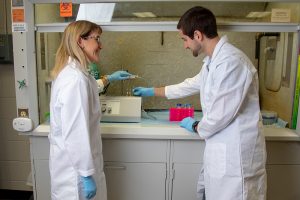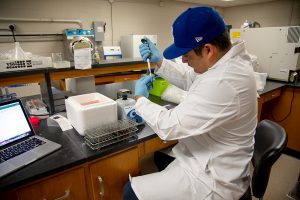Chronic, non-communicable diseases such as type 2 diabetes and cardiovascular disease can lead to serious complications, and even death, if not treated early enough. Research in the Department of Kinesiology and Health Education’s Health & Integrative Physiology (HIP) Lab focuses on identifying biomarkers that can predict those at increased risk for these diseases or those individuals more likely to progress to serious complications.
Early detection of these risks leads to earlier intervention and improved health outcomes. This is especially relevant since these early interventional strategies involve lifestyle modifications such as improved diet and increased physical activity.

Michelle Harrison, director of the HIP Lab, coordinates the research activities in the lab. HIP is a shared laboratory space among faculty and student researchers in the department and across the university. Students who participate in research projects in the HIP lab do so under the guidance of Harrison. With 10 years of experience in a clinical hospital laboratory setting, Harrison is able to share her past experiences and instruct students on testing procedures.
The lab has requisite equipment for phlebotomy, sample processing, and standard biochemical analyses that identify and count biomarkers in saliva, urine, blood, and tissues. Biomarkers are measurable substances whose presence is indicative of disease which can include proteins, amino acids, fatty acids, glucose, HbA1c, etc. – all of which can be measured in the HIP lab.
“Being able to identify specific biomarker ‘footprints’ that are predictive for disease progression is translatable to improved diagnostic and treatment options and, most importantly, overall health and well-being,” says Harrison.
Harrison recently was named co-investigator for a $2.4 million grant awarded to Assistant Professor Audrey Stone by the National Health Institute. Their project will examine the role of inflammation on the cardiovascular response to exercise throughout the progression of type 2 diabetes. Harrison will be involved in mapping the changes in both pro- and anti-inflammatory cytokine signalers throughout disease progression.
This information will then be used to predict when the cardiovascular response to exercise has been altered by diabetes. From a global perspective, this knowledge is translatable to informing exercise prescriptions in this vulnerable population.
Much of Harrison’s work also involves collaborations with other researchers on campus, including the School of Nursing. She recently completed a project with Assistant Professor Julie Zuniga investigating biomarker differences in HIV patients with and without type 2 diabetes.
This led to a recent publication in the journal Amino Acids titled “The additive effect of type 2 diabetes on fibrinogen, von Willebrand factor, tryptophan, and threonine in people living with HIV.” These preliminary results suggest that these four biomarkers were altered when type 2 diabetes was also present in people with HIV. Monitoring these biomarkers may hold predictive power in identifying diabetes in a person living with HIV.

Another aspect of the project focused on whether biomarkers could predict symptoms in these individuals, since symptom severity can affect treatment adherence. A publication in this regard is pending.
A current study with Assistant Professor Ashley Henneghan from the School of Nursing is investigating the ability of a select group of biomarkers to predict risk for the mild cognitive impairment that follows chemotherapy in breast cancer survivors.

